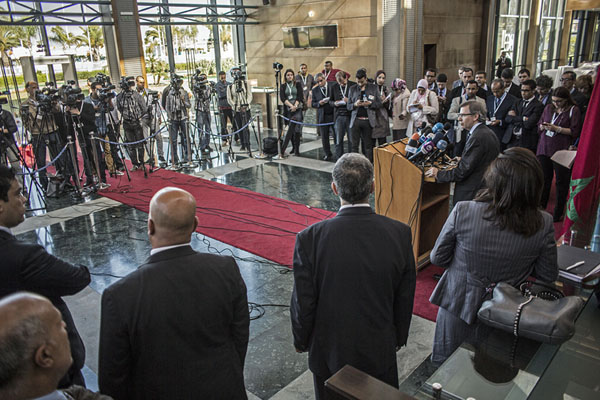By Libya Herald reporters.

Tunis, 15 April 2015.
Delegates to the UN-brokered main political Libya Dialogue talks assembled for the fourth time in . . .[restrict]the Moroccan resort of Skhirat today with UN Special Envoy in firm upbeat mood about the possible outcome and looking for suggestions for the planned government of national unity .
“The main goal of this round that we start today is to agree with all the participants on what could be a final document,” he said at a press conference before the start of the talks. At the end of four days of talks, he explained, “we expect . . to have the final version of the best both parties can get, and to have also a serious discussion on what the names could be.”
The idea it that the delegates would then take the names back to the House of Representatives in Tobruk and the General National Ciongress in Tripoli for approval.
Skhirat IV started late. It should have open yesterday but the delegates from the GNC were unable to fly yesterday to Morocco and arrived only this afternoon. Reasons for the flight problems have not been disclosed but there was also a brief ban on Libya airspace yesterday that also affected flights between eastern Libya and Tunisia.
In a passionate plea for an end to the crisis, Leon noted the attacks on the Moroccan and South Korean embassies, the latest illegal migrant disaster off the coast of Libya and the fighting inside the country. “This is Libya today: terrorism, no controlling of their borders, people dying every day in the Mediterranean, airstrikes, more fighting. It cannot go on. It simply cannot go on”, he said, warning that “the patience of the Libyans is finished and the patience of the international community is finished”.
Calling on both sides “to be flexible, to be generous, to be ready to make concessions”, the UN envoy said that they were coming with “lots of ideas, lots of proposals, lots of remarks”. They could be negative prefering to stay with the present situation in Libya but did not think they would be. Both parties, he said, were “realistic” and had said they thought UN’s proposls were a “good basis for discussion”.
Both sides, too, he said now understood that “we cannot wait anymore and that this will be really the final round where we will agree on this document and we will agree on the main elements for the unity government including, of course, the names.”
There was particular anger at this morning’s airstrikes at Mitiga. “We have never seen airstrikes in the moment in which one of the delegations is taking off in its way to the talks,” he said, calling it “an extremely negative move” and demanding an investigation with an explanation “given to the international community”, so that presumably it could decide on a punitive response.
Leon also said that in addition to the other dialogue platforms running alongside the main one, such as that of party political leader which again took place in Algiers on Monday and those involving municipal representatives, military commanders and tribal leaders would be be augmented by one comprising leading Libya women.
It is not clear if Leon’s upbeat mood because he genuinely expects a result at Skhirat or is more connected to next Monday’s meeting in Luxembourg of the European Foreign Affairs Council, to be attended by most EU foreign ministers. The European Union is hoping to come out with planned support for a Libyan government of national unity.
In contrast, however, to his positive stance, one of the main HoR delgates to the talks, Benghazi member Abubakr Buera, was in sombre mood in Tunis yesterday before leaving for Morocco. He said that more than six months of engagement with the dialogue process had resulted in very little progress, that other members of the HoR were deeply skeptical about its future and that he himself had thought about pulling out.
“We are dealing with the Dialogue because we have to,” he said, expressing concern that if the HoR did not show willingness, the international community thought the UN might “remove our legitimacy”. When pointed out that the UN would lose massive credibility if it tried to delegitimise a national parliament elections for which it itself had organised, he said that the UN did not “care anymore that we were legitimately elected”.
Despite Leon’s talk about needing names for a government of national unity, Buera also confirmed that although the HoR had approved the plans that emerged from Skhirat III for such a government, the HoR had not dissussed any names, that he and his colleagues were not taking back any to put on the table, and that they were attending the latest talks simply “to listen”.
The GNC team has also said that it has no names in hand.
Buera was himself in angry mood over the the statement of support for the Ansar Al-Sharia-linked Benghazi Revolutionaries’ Shoura Council by the Khalifa Ghwell home the GNC appointed as its prime minister. He said he had sent a strong letter to Leon saying that Ghwell’s support for a group designated by the UN itself as terrorists threatened to “completely destroy the dialogue”.









